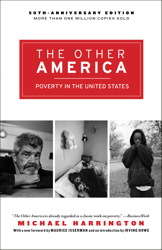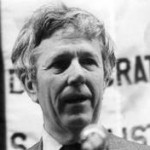
The Persistence of Poverty In America Today
Come and become a part of the solution!
Please join us on Wednesday, October 3rd at a special event in honor of the 50th anniversary of the publication of Michael Harrington’s The Other America. A panel discussion will explore the issue of poverty today and discuss how we can deal with poverty as a community and as a nation. The event is sponsored by the Democratic Socialists of Central Ohio, in conjunction with Simply Living, the Green Education Fund, Jobs for Justice and other supporters.
 There is much work to do and everyone can do their part. The SOLE Coalition is working in the South Side of Columbus with partners to support and promote independent, locally owned businesses as one strategy to create jobs and create wealth in a struggling community. Simply Living supports sustainable initiatives through its Transition Hub in central Ohio. One example is our participation in the Care and Share Time Bank, another strategy that can help low income individuals while building community at the same time.
There is much work to do and everyone can do their part. The SOLE Coalition is working in the South Side of Columbus with partners to support and promote independent, locally owned businesses as one strategy to create jobs and create wealth in a struggling community. Simply Living supports sustainable initiatives through its Transition Hub in central Ohio. One example is our participation in the Care and Share Time Bank, another strategy that can help low income individuals while building community at the same time.
Background
Fifty years ago in a very different America, members of the largest middle class in our history were astonished to learn that there was poverty in their midst. Michael Harrington’s The Other America focused awareness of the issue of poverty in America and sparked an effort to overcome the problem. President Lyndon Johnson declared a War on Poverty, and, from that point forward, actual poverty rates declined to 11.1 percent in 1973. Unfortunately, the poverty rate has since then risen to an alarming 15 percent.
 It was recently reported that 46 million Americans are now counted as poor. As bad as that is, the numbers would be nearly double that without programs such as food stamps and Social Security, which would then place another 40 million people into poverty.
It was recently reported that 46 million Americans are now counted as poor. As bad as that is, the numbers would be nearly double that without programs such as food stamps and Social Security, which would then place another 40 million people into poverty.
Why does the richest country in the world have such an abysmal poverty record? Why is this situation absent from this year’s election discussions? The short answer could be that the poor don’t vote or can’t afford to contribute money to campaigns.
Many of the causes actually cited: low wage jobs (most of the poor work), single-parent homes, etc. also exist in other countries without such effects. Of the 46 million Americans counted as poor, six million people have no income other than food stamps. Discussion of these issues frequently plays on fears of losing status and demonizes the poor, who function something like a canary in a coal mine for the eroding middle class.
Come and listen and decide for yourself!
Panelists for this event will include: Lisa Hamler-Fugitt, Director, Ohio Association of Second Harvest Food banks; Fadhel Kaboub, Assistant Professor, Economics Department, Denison University; Kevin Boyle, Professor, History Department, Ohio State University; Bob Fitrakis, Professor, Columbus State Community College, writer, publisher of the Free Press. This event will be held at Progress Ohio, 172 East State Street, at 7 p.m. For more information call 614-288-5738 or email smorgen at juno dot com.
